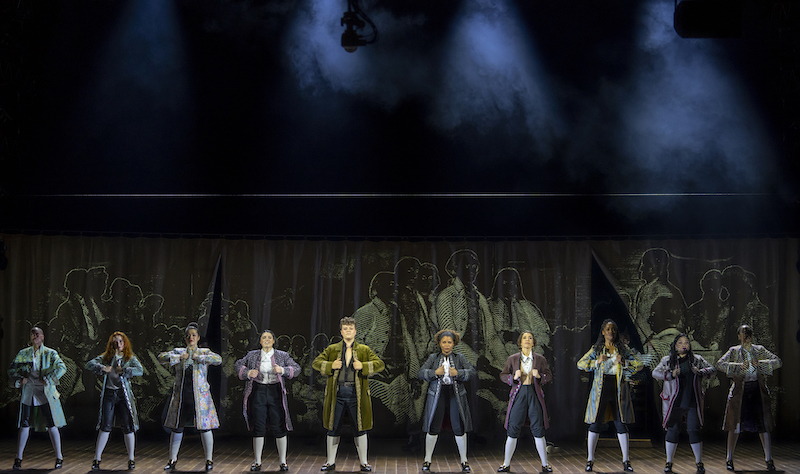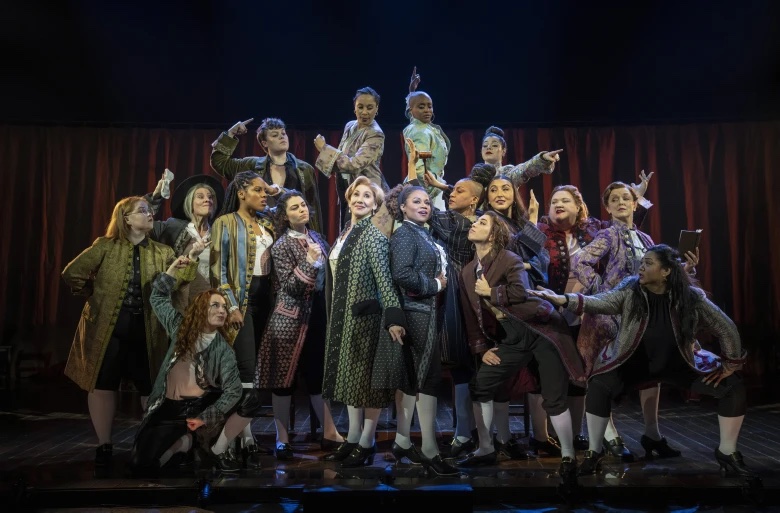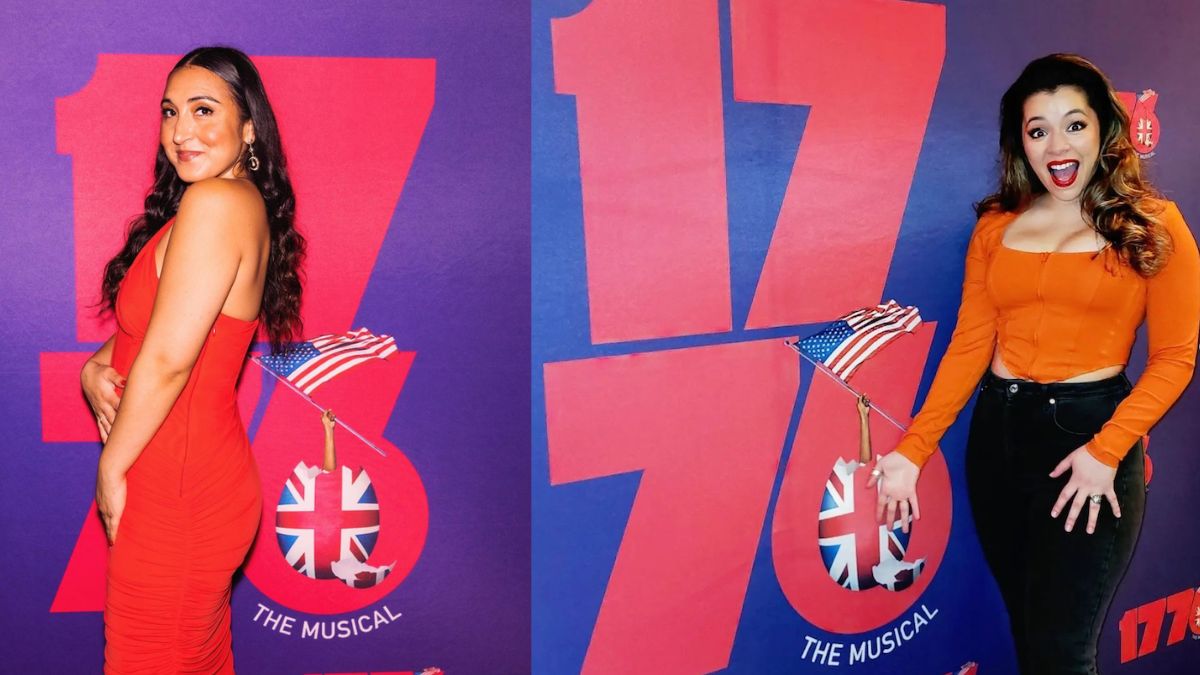Written by Cris Franco
In 1969 when composer/lyricist Sherman Edwards premiered 1776, his Tony Award-winning musical chronicling the drama behind the drafting of the Declaration of Independence, the piece distinguished itself in two remarkable ways. It featured musical theater’s longest scene (over 30 minutes) without a single played note or song and it presented a large nearly all-male cast, all Caucasians. Book writer Peter Stone [(Charade (1963), Father Goose (1964), Mirage (1965)] stayed true to the times by having the male characters handle the nation building, while the play’s only two female roles (Abigail Adams and Martha Jefferson) handled the affairs of the heart. Both females exist primarily as their husbands’ romantic counterparts.
The latest incarnation of 1776 playing at Los Angeles’ Ahmanson Theater through 7 May 2023, adds yet another distinguishing mark by casting only female, non-binary or trans actors – many of color. The result has been a production which has both befuddled and bewitched critics. But across the board, the show’s cast has garnered praise for retelling a well-known story in a new, powerful way. It’s an ensemble that poses profound questions on gender, identity and the often overlooked role minorities had in building our modern American empire.
I had the privilege of asking my own questions of two of the current touring cast’s most notable actors Shelby Acosta and Kassandra Haddock.

CRIS FRANCO (CF):
First off, congrats on being cast in this revolutionary production of 1776. How do you identify ethnically and what are your pronouns?

SHELBY ACOSTA (SA): Hi! My name is Shelby Acosta, my pro-nouns are She/Her and I am a proud chingona aka Mexican-American gal.
KASSANDRA HADDOCK (KH): I identify as Mexican-American and I use She/Her pronouns.
CF: Much has been made of this non traditional approach to a much beloved musical play. How would you describe the concept behind this version of 1776?
SA: The concept is a deeply personal one for me. It asks, what if these different body types, gender identities and ethnicities had been included in the discussion of independence instead of only Colonial era White men? How does the meaning of the original text differ when it’s delivered by an Indigenous woman or a non-binary trans person? At show’s end, what is the audience’s reaction to seeing Black-identifying actors declaring American independence now knowing that our nation’s freedom was negotiated by only retaining slavery? It’s an important piece that I find requires thought and vulnerability from both the audience and cast.
KH: Our version tells the story of our country’s founding through the lens of those who would not have been allowed in the room at that time: female, non-binary, trans and BIPOC voices. Its goal is to make you ask questions, learn parts of our history that you otherwise might not have known and to hold multiple realities at once. How did we begin? What did we fight for? What do we still fight for? How are things different or the same from 1776 to 2023?
CF: Yes, it’s eye-opening to see characters usually played by White cisgender males now portrayed by a more diverse cast that features females. There are some 24+ male speaking roles in 1776, all recognizable historical figures. Who do you play and how would you describe your character?
SA: I play Secretary Charles Thomson—the greatest secretary to ever live! Not really, but he did serve as Secretary of Congress through its entirety and is special in my eyes. Thomson was a very smart man who knew how to do his job— I play him as a “no nonsense” member who is there to convey George Washington’s messages directly to the Congress. You only hear Washington’s words when Thomson reads aloud his military dispatches. He is the link between the outside war world and the inside congress. Towards the end of the show, Thomson realizes where his duties lie and he lets his emotions show in defense and on the side of General George Washington.
KH: I play the villain, Edward Rutledge from South Carolina. But not all villains are easily recognizable. And most importantly, most villains don’t view themselves as such.
CF: True. But I’d like to add that if Rutledge is the villain, he’s not alone. His character calls out the hypocrisy of the Northern delegates who claim a moral high ground by condemning the evils of slavery, as the North actively profiteered from the transporting and sale of enslaved people. Rutledge makes this claim via his climatic aria, “Molasses to Rum” that so brilliantly details all the colonies’ shared sin of the “triangle trade”. That’s just one of the messages in 1776, how do you think casting performers who identify as female, non-binary or trans impacts the message and/or experience of 1776?
SA: I think it brings our audience face-to-face with the reality that we are still fighting for trans rights and the rights for Black and Brown people to walk the streets without having to worry about cops or ICE. We are still fighting for the right to our own bodies. (Whew! I promise I’m a lot more fun at parties.)
KH: The text sends a different message with our production. Debates around slavery, which were originally written to be delivered by White male actors, have a different impact when spoken by our cast. A lot of people have said to me how boring this show would feel now after having seen it through the lens of female, non-binary, trans and people of color.
CF: Singing, dancing and very serious acting — this piece requires a lot of its players and I know for a fact that the casting was very competitive. A huge number of the female, non-binary and trans talent pool auditioned to be part of this theatrical experiment. You two were cast because of your outstanding skills. Where were you trained and what are some of your career highlights?
SA: One of my career highlights was playing Cinderella in Into The Woods at the Zach Scott Theatre in Austin, TX. As a Latina I grew up with a curvier body than most of the tiny, White, TV and movie princesses I saw growing up. Getting to play a princess was a turning point in my career. It gave me confidence. And presenting the show in Texas, where I knew there would be Latina girls watching, made me feel great to know I might inspire someone to feel confident about themselves and to go for any role they want.

KH: I studied Music Dance Theatre at Brigham Young University. I recently had the honor of portraying Gloria Estefan in On Your Feet, playing my dream role of Nina in In The Heights, and being my favorite Pink Lady Rizzo in Grease.
CF: Wow! Those are all tremendous credits that require gifted performers. How did you come to be cast in 1776?
SA: Getting cast in 1776 was a bit of a whirlwind. I remember submitting for it way back in 2021 but never hearing anything until I got an email from my agent for an initial video audition. I sent in the stuff and didn’t hear anything for about a month. Then got asked to submit more material on a random Wednesday and by Friday morning I had gotten the offer to be a standby on Broadway with the rehearsals starting the very next day. Through being on Broadway, I was asked to hop in permanently as Charles Thomson on tour!
KH: My journey actually started back in August 2022 when I was in for a Broadway standby (didn’t get it ). In fact my fellow Mexican friend here, Shelby, landed that! I later went through various callbacks and after auditioning for eight different characters I landed the role of Rutledge.
CF: Which is a casting coup on your part because Rutledge evolves into one of the second act’s leading characters. Aside from costuming you all in period suits, little else is done to imply that you are portraying men. Do you strive to play your character as male ?
KH: I absolutely do not play my role as male. I told myself going into the auditions that my sole focus would be to tell the story. And I have to say that I was never once given the note to act like a man. I am very grateful that we have been allowed to just tell the story, because at the end of the day these are all human beings, and who’s to say what a man should or should not act like?
SA: I don’t chose to play my character as a male either. The whole basis of the show is we are our bodies—the color, the shape, the identity— stepping into the shoes of these men and saying these words through our POV. Now whether I am feeling more masculine or feminine that day all depends on how I bring myself to the character. I cross my legs on stage one day, I man spread the next—it’s all about how my body fits in relation.
CF: “Man spreading”! You could interpret the centuries of American expansionism as “man-spreading” all in the name of Manifest Destiny. That’s when having actors of color on stage can be so impactful. Although things are changing, diversifying casts remains a work-in-progress and an actor’s life is never easy. What is your background and has your family supported your career?
SA: I grew up in El Paso, TX which borders Juarez, Mexico and there wasn’t much theatre in the area when I was growing up. However, one day a friend’s mother opened up a theatre company and I spent many years performing with what basically became my second family. My parents have always been very supportive, so when I decided to pursue a theatrical career my mom did everything in her power to send me to a performing arts boarding high school in Michigan (Interlochen Center for the Arts). From there I went to Texas State University where I got my BFA in Musical Theatre. I absolutely could not have done it without the support of my mom who enrolled me in any and all theatre classes, took me to all my auditions and believed in me with her entire being.
KH: I was actually raised very religious! I was Mormon for a time (hence going to BYU). My mother, too, has been my biggest supporter and has never wavered as such. She is the epitome of a Mexican mama raising a first generation American daughter to achieve the American dream.
CF: I’m overjoyed that you were both instilled with a desire to go for your dreams. What do you hope the audience will take away from 1776?

SA: I hope they will walk away with an understanding of the sacrifices that had to be made in order for this nation to be born, and realize that America today would be nothing without the participation of the wide spectrum of humanity they see onstage. And of course, I hope they have fun and enjoy a laugh here and there. Ultimately the message is strong because the cast is incredible and fully committed to playing their roles. Above all, you’re guaranteed to have a great time. There are funny moments in the show, I promise.
KH: I hope people leave with a broader perspective saying, “Wow they never taught us that in school about our country’s founding!” I hope audiences leave inspired to continue to change the world.
CF: Amen. I, too, believe that art can help change the world for the better. What advice do you have for aspiring performers?
SA: There are absolutely no limits. Never let someone tell you that you are “too much” of anything to play the roles you want. If someone does, then you don’t want to be a part of that person’s vision anyway. This industry is filled with a lot of “nos” but if you love the work and persist, you will eventually get a “yes. ” It’s hardly ever about you as a performer—it’s more about the right time and place. If you believe you can do it, that is all the faith you need.
KH: If performing makes you happy then just do it. Do it wherever and whenever you can. This industry will tear you down and lift you up, but it’s up to you to find happiness through it all. It’s not about the awards or the fame and fortune, it’s the journey that matters, so learn to love the journey.
If you’d like to witness the very talented Kassandra Haddock and Shelby Acosta take a journey into theater’s diverse future via a trip to our nation’s past, see 1776 now playing the Ahmanson Theater thru 7 May 2023. For all show info: CenterTheatreGroup.org



